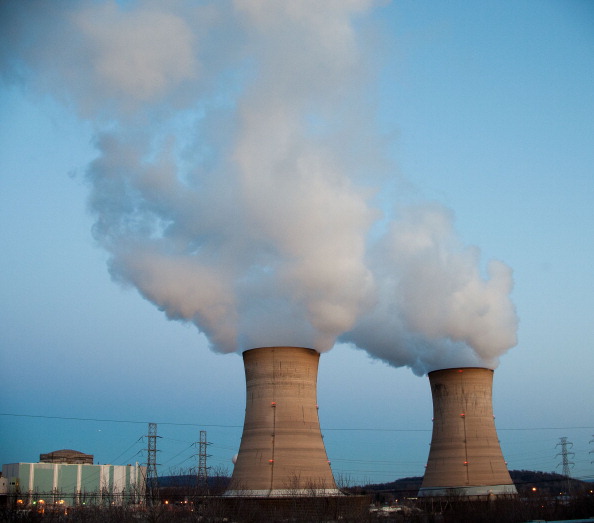The Trump administration really does not want a Chinese company to buy the Westinghouse nuclear business


A free daily email with the biggest news stories of the day – and the best features from TheWeek.com
You are now subscribed
Your newsletter sign-up was successful
The Trump administration is reportedly plotting to head off Chinese investors' likely attempts to buy the bankrupt Westinghouse Electric Co. from parent company Toshiba Corp. in order to protect its nuclear secrets, Bloomberg reports.
Half of the more than 430 nuclear power stations around the world use Westinghouse technology; the company is responsible for building and maintaining reactors in the United States. Westinghouse has long been a target of Chinese espionage, most recently when the China General Nuclear Power Corp. was indicted in 2016 for conspiring to steal restricted technology.
Energy Secretary Rick Perry and Treasury Secretary Steven Mnuchin have reportedly discussed plans to prevent the sale of Westinghouse to a company with ties to the Chinese government. "The government might block a sale to a Chinese buyer; encourage an alternative bid from U.S. or friendly foreign investors; or the government might invest in the company directly in return for an equity stake, akin to the Obama administration bailout of U.S. automakers," Bloomberg writes.
The Week
Escape your echo chamber. Get the facts behind the news, plus analysis from multiple perspectives.

Sign up for The Week's Free Newsletters
From our morning news briefing to a weekly Good News Newsletter, get the best of The Week delivered directly to your inbox.
From our morning news briefing to a weekly Good News Newsletter, get the best of The Week delivered directly to your inbox.
"Do we want that maintenance to be done by the Chinese? There are some bona fide national security issues to giving the Chinese that kind of access to our power grid backbone," explained former U.S. Navy Commander Kirk Lippold on Tuesday. Westinghouse is expected to arise in conversation between President Trump and Chinese President Xi Jinping when the pair meet at Mar-a-Lago later this week.
A free daily email with the biggest news stories of the day – and the best features from TheWeek.com
Jeva Lange was the executive editor at TheWeek.com. She formerly served as The Week's deputy editor and culture critic. She is also a contributor to Screen Slate, and her writing has appeared in The New York Daily News, The Awl, Vice, and Gothamist, among other publications. Jeva lives in New York City. Follow her on Twitter.
-
 6 of the world’s most accessible destinations
6 of the world’s most accessible destinationsThe Week Recommends Experience all of Berlin, Singapore and Sydney
-
 How the FCC’s ‘equal time’ rule works
How the FCC’s ‘equal time’ rule worksIn the Spotlight The law is at the heart of the Colbert-CBS conflict
-
 What is the endgame in the DHS shutdown?
What is the endgame in the DHS shutdown?Today’s Big Question Democrats want to rein in ICE’s immigration crackdown
-
 TikTok secures deal to remain in US
TikTok secures deal to remain in USSpeed Read ByteDance will form a US version of the popular video-sharing platform
-
 Unemployment rate ticks up amid fall job losses
Unemployment rate ticks up amid fall job lossesSpeed Read Data released by the Commerce Department indicates ‘one of the weakest American labor markets in years’
-
 US mints final penny after 232-year run
US mints final penny after 232-year runSpeed Read Production of the one-cent coin has ended
-
 Warner Bros. explores sale amid Paramount bids
Warner Bros. explores sale amid Paramount bidsSpeed Read The media giant, home to HBO and DC Studios, has received interest from multiple buying parties
-
 Gold tops $4K per ounce, signaling financial unease
Gold tops $4K per ounce, signaling financial uneaseSpeed Read Investors are worried about President Donald Trump’s trade war
-
 Electronic Arts to go private in record $55B deal
Electronic Arts to go private in record $55B dealspeed read The video game giant is behind ‘The Sims’ and ‘Madden NFL’
-
 New York court tosses Trump's $500M fraud fine
New York court tosses Trump's $500M fraud fineSpeed Read A divided appeals court threw out a hefty penalty against President Trump for fraudulently inflating his wealth
-
 Trump said to seek government stake in Intel
Trump said to seek government stake in IntelSpeed Read The president and Intel CEO Lip-Bu Tan reportedly discussed the proposal at a recent meeting
